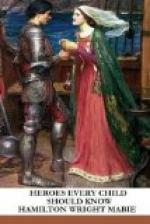While they were passing the spot where Tell lay concealed, he heard the cruel tyrant denouncing the most deadly vengeance, not only on himself, but his helpless family: “If I live to return to Altdorf,” he exclaimed, “I will destroy the whole brood of the traitor Tell, mother and children, in the same hour.”
“Monster, thou shalt return to Altdorf no more!” murmured Tell. So, raising himself up in his lair, and fitting an arrow to his bow, he took deadly aim at the relentless bosom that was planning the destruction of all his family.
The arrow flew as truly to the mark as that which he had shot in the market-place of Altdorf, and the tyrant Gessler fell from his horse, pierced with a mortal wound.
The daring archer thought that he had taken his aim unseen by human eye; but, to his surprise, a familiar voice whispered in his ear, “Bravo, uncle! that was the best-aimed shaft you ever shot. Gessler is down, and we are a free people now.”
“Thou incorrigible varlet, what brings thee here?” replied Tell, in an undervoice, giving Philip a rough grip of the arm.
“It is no time to answer questions,” returned Philip. “The Rutli band are waiting for thee, if so be thou canst escape from this dangerous place; and my business here was to give thee notice of the same.”
On this, Tell softly crept from the thicket, and, followed by his nephew, took the road to Stienen, which under cover of darkness, they reached that night.
Philip, by the way, after expressing much contrition for having seduced little Henric to go to the fair with him, informed his uncle that Henric and Lalotte had been safely conducted home by one of the band of the Rutli who chanced to be at Altdorf fair.
When they reached Stienen Tell was received with open arms by Stauffacher, the leader of the Rutli band; and with him and the other confederates, he so well concerted measures for the deliverance of Switzerland from the German yoke, that, in the course of a few days, the whole country was in arms. The Emperor of Germany’s forces were everywhere defeated; and on the first day of the year, 1308, the independence of Switzerland was declared.
His grateful countrymen would have chosen William Tell for their sovereign, but he nobly rejected the offer, declaring that he was perfectly contented with the station of life in which he was born, and wished to be remembered in history by no other title than that of the Deliverer of Switzerland.
This true patriot lived happily in the bosom of his family for many years, and had the satisfaction of seeing his children grow up in the fear of God and the practice of virtue.
CHAPTER XVI
ROBERT BRUCE




